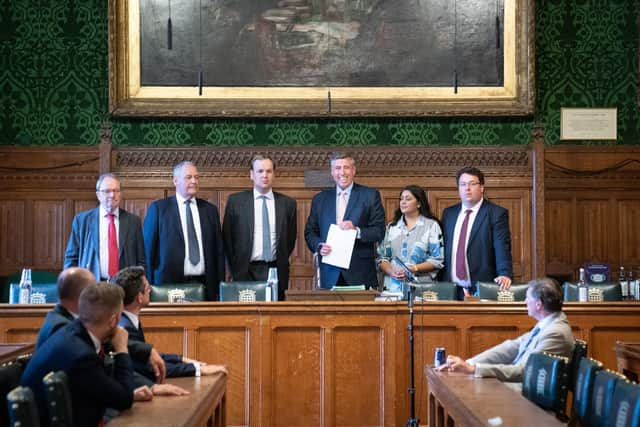Why candidates for Prime Minister should be inspired by legacy of Skipton's Iain Macleod - Greg Wright
It might be wise for everyone to simmer down and pause for reflection. Nobody, it seems, expects to win by appealing to the more liberal wing of the Conservative party, which is a shame, because the party’s “One Nation” heritage has much in its favour.
In particular, “One Nation” conservatism is far more likely to appeal to floating voters whose support will be essential if the Tories are to beat off the challenge from a reinvigorated Labour Party under Sir Keir Starmer.
Advertisement
Hide AdAdvertisement
Hide AdOne of the most eloquent “trumpeters” for this brand of conservatism came from Yorkshire, and must surely rank among the greatest Prime Minister we never had.


Any contender for the leadership of this country would be wise to spend time perusing the speeches of Iain Macleod, who was born in Skipton.
Macleod was one of Yorkshire’s most influential sons; he helped to oversee the decolonisation of Africa, opposed the ‘Magic circle’ of grandees who held sway over the Tory party, supported the abolition of the death penalty and expanded the still-fledgling NHS.
Macleod, who died in 1970 after serving as chancellor of the exchequer for just three weeks in Edward Heath’s newly-elected Tory Government, was a colourful, incisive, multi-faceted character who would have probably never made it into the Cabinet today. He was a passionate risk-taker who could remember a poem as clearly as a bridge hand.
Advertisement
Hide AdAdvertisement
Hide AdIn his autobiography, A Life at the Centre, Roy Jenkins, who served as Chancellor in Harold Wilson’s Labour Government of the late 1960s, said: “It was a horrible irony that the job which he had coveted was snatched so soon out of his hands and placed into the much feebler ones of Anthony Barber (Macleod’s successor).
“It was also a great blow to the balance and force of the Heath Government. ‘We have lost our trumpeter’, someone said and that Government was short on trumpeters.
“But Macleod was more than that. He was a politician of insight and insolence, which latter quality put him in a tradition of Canning and Disraeli, Joseph Chamberlain and FE Smith. In spite of his resentment of me, I greatly regretted his disappearance from the scene. He might have made a significant difference to the evolution of politics over the next 20 years.”
Macleod served as Minister of Health, Minister of Labour, Colonial Secretary and Leader of the House of Commons in the 1950s and early 1960s, bringing the mental sharpness he acquired as a a professional card-player to the Cabinet table.
Advertisement
Hide AdAdvertisement
Hide AdMacleod had the tough job of convincing the electorate that the Conservatives really believed in the principles behind the NHS, while resisting attempts to limit its scale. Without Macleod the NHS we take for granted today might not exist.
In a famous speech, Macleod told the 1961 Conservative Party conference: “I believe quite simply in the brotherhood of man - men of all races, of all colours and of all creeds.”
Later in the decade, he was disgusted with the racist undertones in Enoch Powell’s “Rivers of Blood” speech and treated Powell as a pariah for the rest of his life. Macleod, who played a leading role in the formation of Crisis, the charity for homeless people, was never scared to make enemies, and this is why his path to Number 10 remained blocked. His premature death robbed the country of a man of vision who believed in a brand of compassionate conservatism that would have been a healing force in our troubled times.
As the leadership contest descends into bitter feuding, it might be a good time for the candidates to raise their sights and consider the world beyond Westminster.
Advertisement
Hide AdAdvertisement
Hide AdThe Conservative Party that promoted men like Iain Macleod to high office had principles with universal appeal; based around fair taxation, the promotion of private enterprise and an ironclad commitment to the NHS.
Macleod’s grave in the village of Gargrave should be a place of pilgrimage for anyone who believes politics must be conducted with a human face.
Comment Guidelines
National World encourages reader discussion on our stories. User feedback, insights and back-and-forth exchanges add a rich layer of context to reporting. Please review our Community Guidelines before commenting.
